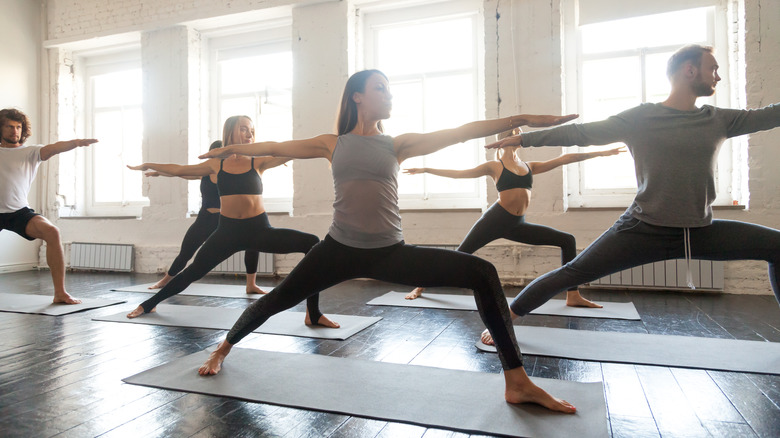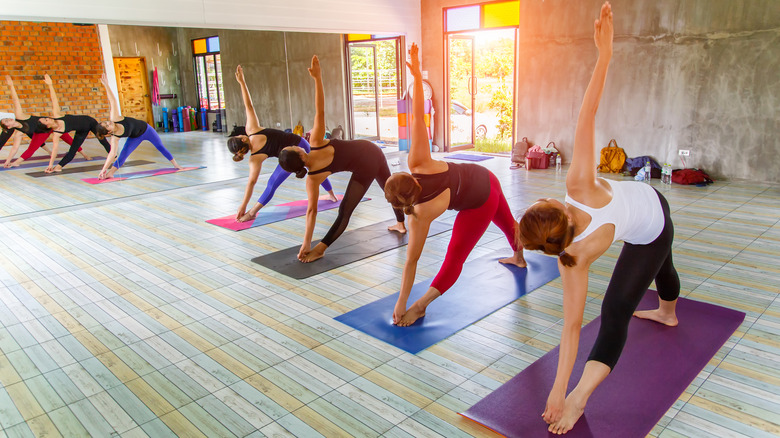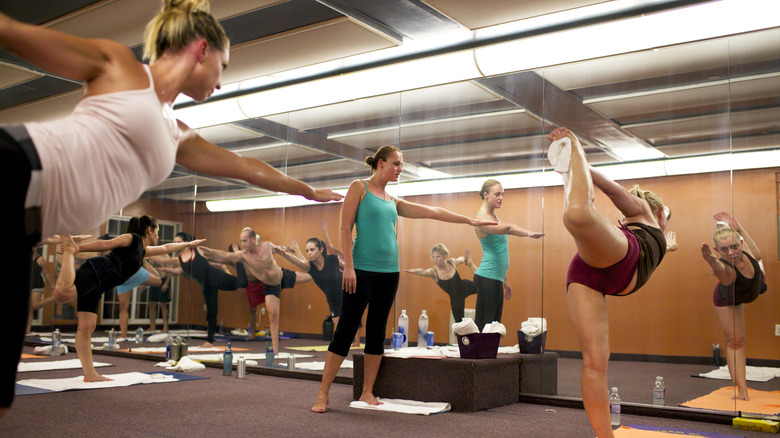The Dangers Of Hot Yoga You Need To Know Before Your Next Sweat Session
We may receive a commission on purchases made from links.
Hot yoga can provide physical benefits, like increased flexibility and a potential boost for weight loss. Hot yoga is sometimes used to describe Bikram yoga classes, but not all hot yoga classes are Bikram classes. The 90-minute Bikram class is indeed taught in a hot room—at 105 degrees Fahrenheit with 40% humidity, but for it to be Bikram, it follows 26 specific poses, always in the same order, according to Shape. Alternatively, hot yoga classes may be at a range of temperature points, though assume it will be at least 80 degrees Fahrenheit and with a variety of humidities, per Nike. The poses and routine in a non-Bikram hot yoga class will likely be more varied, and there won't necessarily be a 90-minute length.
If you're going to do a hot yoga class, Bikram or not, you need to be prepared before you go in, and you should realize that hot yoga might not be for you. There are dangerous pitfalls that can await hot yoga practitioners, and being aware of the potential danger and listening to your body can help keep you safe.
Staying hydrated is key to benefiting from a hot yoga class
You'll definitely be getting more of a cardio burn in a hot yoga session compared to a more traditional yoga class since the increased temperature in the room increases your heart rate — and that's one of the reasons that people like hot yoga. You will sweat. A lot. And that can lead to problems if you're not careful. Drinking water in the class itself may not be enough if you don't go to the class already well-hydrated. If you feel dizzy or are getting muscle cramps in your hot yoga class, that may be a sign of dehydration, according to YogaFever.
You should listen to your body and step out to get some water and bring your body temperature down if you feel this way, and don't forget to hydrate after the class itself. And water alone may not be enough. In a scientific study on Bikram yoga, it was confirmed that along with water volume, people lose electrolytes. Healthline suggests drinking coconut water or other electrolyte-infused water in class and afterward to help combat the loss.
Flexible muscles can be stretched to a point of injury in a hot yoga class
It comes to really listening to and being in tune with your body. Exercise scientist Brian Tracy told The Washington Post: "My big piece of advice for people who want to try hot yoga is to take it slowly. If you don't feel right, take it easy. If a yoga instructor starts yelling at you, remember you're a human being. You're not being held hostage." If you don't get hydrated or if you try to push through feeling faint or getting cramps, you could end up hurting yourself.
The heat in the room also means that your muscles don't need as much movement and time to literally warm up. And warmed-up muscles are more flexible, according to PennState Extension. That may seem ideal for a yoga class, but there's a limit to that benefit. With that increased flexibility — which you may be more likely to notice if you're not a frequent hot yoga fan — you can end up over-extending and hurting yourself, per Insider. And it takes your tendons and ligaments longer to warm up than your muscles, so there's potential for pushing it too far, too quickly.
Those with certain pre-existing conditions should speak with their healthcare provider before a hot yoga class
Some pre-existing conditions, like cardiovascular disease, mean you should talk to your doctor before trying a hot yoga class. That isn't to say that people with these conditions shouldn't ever do hot yoga, but an honest conversation with your healthcare provider will help keep you safe. According to Cleveland Clinic, if you have asthma, allergies, or other respiratory ailments, there's potential for the heat in the room to exacerbate those conditions. And if you have diabetes, a hot yoga class can have an impact on your blood sugar levels, as noted by YogaFever.
For those with low blood pressure, which can include pregnant people in the first trimester, the heat in a hot yoga class can result in a higher chance of fainting. Hot yoga is not recommended for pregnant people, considering the already loosened muscles that happen during pregnancy, and increased heat inside a pregnant person's body can lead to an increase in neural tube defects, per an article in the Canadian Family Physician journal.
After considering all potential risk factors, you can decide if hot yoga is a good choice for you.



